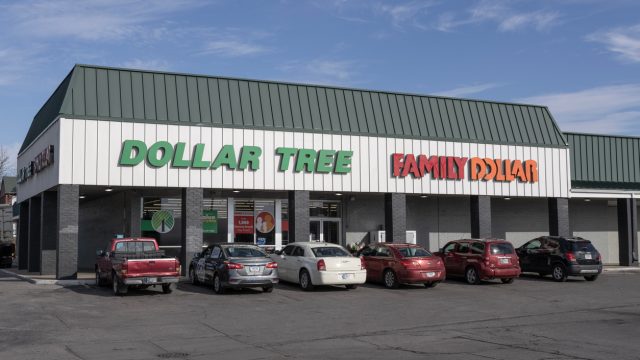Family Dollar and Dollar Tree Are Closing 1,000 Locations

These days, it seems that there are more Dollar Tree and Family Dollar locations than ever before. Some cities have even begun to push back against the spread of the co-owned chain due to the impact it can have on the communities it’s meant to serve. But now, Family Dollar and Dollar Tree have announced they will be closing a significant number of locations in the coming months due to flagging business.
RELATED: The Body Shop Is Closing All U.S. Stores After Filing for Bankruptcy.
On March 13, Dollar Tree announced that it had posted a fourth-quarter net loss of $1.71 billion, Reuters reports. The retailer also fell short of its sales estimates, posting $8.63 billion instead of the $8.67 billion expected by analysts. By comparison, the company saw a profit of $452.2 million last year.
As a result, the company says it plans to close roughly 600 Family Dollar stores in the first half of this year, CNN reports. It will also shutter 370 more in the coming years when individual store leases expire, as well as 30 Dollar Tree locations.
During an earnings call last December, Dollar Tree CEO Rick Dreiling said that a massive recall of over-the-counter drugs sold at the stores had affected sales and suggested the company was considering scaling back its footprint, Fox Business reports.
“To this end, we have initiated a comprehensive review of our Family Dollar portfolio to address underperforming stores that are not aligned with our transformative vision for the company,” he said.
The two discount retailers came together in 2015 when Dollar Tree purchased the struggling Family Dollar for $8.5 billion, CNN reports. But even after the company worked to improve stores, increased competition and economic shifts have made it difficult for the retailer.
The company—which currently has over 16,700 stores in 48 states and Canada—previously announced it would be closing 400 locations in 2019, per Bloomberg. Experts say the latest announcement shows the retailer is still struggling to stabilize the company. “Nearly $2 billion in assorted impairment charges suggests widespread efforts to improve operations have had mixed results and that the right formula remains elusive,” Jennifer Bartashus and Jibril Lawal, analysts for Bloomberg Intelligence, wrote in a note.
Increased scrutiny on the chain over its business practices and store safety hasn’t been subtle. Last September, Matt O’Shea, Alderman of the 19th Ward of Chicago, sent a letter to the Chicago Department of Business Affairs & Consumer Protection detailing a Dollar Tree store in his district that had overflowing trash cluttering its storefront, “unsafe building conditions,” and other issues.
And in Nov. 2023, officials in Detroit pushed back against the spread of dollar stores like Dollar Tree and Family Dollar.
“The need for such regulation arises from the unchecked proliferation of dollar stores in Detroit, which, in my opinion, has had detrimental effects on our community,” Detroit City Council Member Angela Whitfield-Calloway wrote in a memo. “Dollar stores often prioritize offering processed and low-nutrition items, which can contribute to food deserts and worsen health disparities in underserved neighborhoods. This can have long-term negative public health effects that ultimately weaken the well-being of Detroiters.”